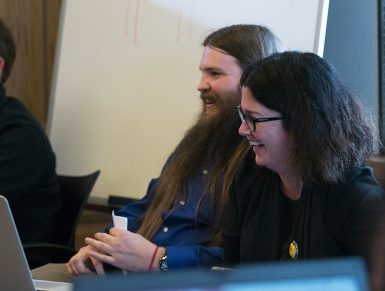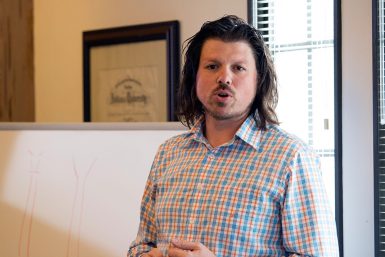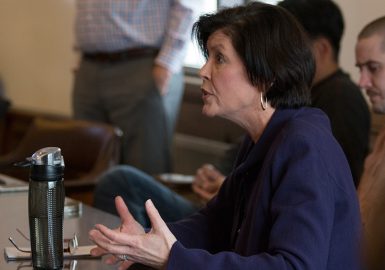Colloquium speakers address social media as research, as political tool

Two presentations Friday explored how social media played a role in the Scottish independence vote and how researchers have explored new media in the last 10 years.
Professor of practice Elaine Monaghan and doctoral student Phil Anderson presented “Tail Wagging the Dog? The Significance of Social Media in Scotland’s Independence Referendum,” and Lesa Hatley Major, associate executive dean for the Media School, and School of Public Health assistant professor Galen Clavio presented “A Census of Social Media Research in Communication and Journalism, 2004-14” during the Research Colloquium in Ernie Pyle Hall.
Social media and Scottish independence
As Scots prepared to decide whether to split from the United Kingdom, did messages on social media inform the political strategies of the “yes” and “no” campaigns?
That’s the question Monaghan and Anderson plan to answer.
Monaghan said the project will look at social media during the Scottish independence campaign and if the content forecasted what happened on the ground leading up to and after the vote.
In September 2014, Scots voted on whether Scotland should separate from the United Kingdom and form its own country. The campaign in favor of the secession lost by roughly 10 percent of the vote, Monaghan said, and 84.5 percent of people went to the polls.
Social media indicated that the “yes” vote would win the campaign, Monaghan said, and the idea is that older voters opposed to the split weren’t using the online platforms.
Since the vote, the National Party has seen a surge of support, and another vote on independence could be held as other political issues are facing Scotland, Monaghan said.
“A lot of activity around this is happening on social media,” she said.
Social media is like a hammer, Anderson said. It can be used to build something or tear it down.
“Social media’s just a tool,” he said, and it’s important to see how it’s used in a political context.
Assistant professor Laura Meadows said the project is an interesting way to look at social media’s ramifications for political movements.

Researchers still wrangling with social media
While the research around social media has increased in volume, communications scholars are grasping at ways to analyze it. Since Facebook launched in 2004, media researchers have been exploring the new world of social media, Clavio said, and the pair’s work sought to find out the features of that work.
Clavio and Major pulled articles from the top 10 communications journals, including Communication Research, Journal of Communications and Public Opinion Quarterly, and examined researchers’ methodology, chosen medium and theory used for the work.
Of the 30 articles reviewed, Clavio said traditional communications theories were absent from the literature.
“No theory was most prominent,” Clavio said.

Clavio said there are no emergent theories on new and social media, and that’s why no theory is driving current research.
Professor Emeritus David Weaver said he’s not surprised that Clavio and Major didn’t find much theory in the social media research. As with any new medium, researchers first use descriptive methods to look at it.
Meadows said there’s still a lot of work to be done around social median and more development is needed on the theory front. She said researchers are getting past the descriptive work around social media and looking more at theory.
“That’s exciting,” she said.

